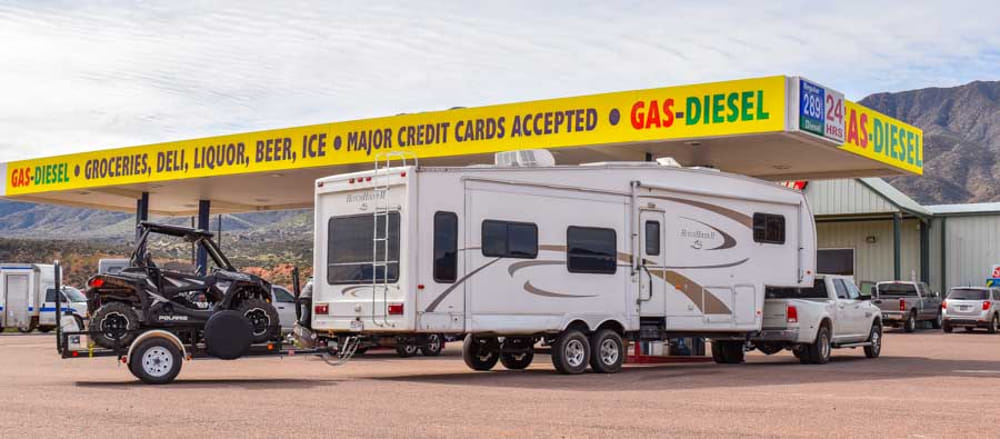The first step is to know how much fuel you need. You can usually find this information on the website of the truck stop you are planning to visit.
Next, make sure your trailer has a hitch that can be used at the truck stop. You will want to call ahead and ask if they have a hitch or if you need to bring your own.
Finally, make sure your trailer has enough clearance for the gas station’s pumps. If not, you may have to unhitch it and refuel from the side of your vehicle.
What gas mileage do you get pulling a travel trailer?
Travel Fuel Economy Fuel economy hovers around 10 miles per gallon. Pulling a trailer is considered more economical. It relies on the truck or SUV for its gas mileage, and this means getting an average of 20 miles per gallon. Even if it’s just 15 mpg, that’s a vast improvement at today’s prices.[1]
What kind of gas does an RV take?
Octane Recommendations Regular unleaded gasoline with a pump (R+M)/2 octane rating of 87 is recommended. Some stations offer fuels posted as Regular with an octane rating below 87, particularly high altitude areas. Fuels with octane levels below 87 are not recommended.[2]
How much does it cost to fill a RV?
Manufacturers claim that their RVs get anywhere from 10-20 miles per gallon. At $2.50-$4.00 per gallon and 25-150 gallons per fuel tank, gas can cost you anywhere from $60 to $600 to fill up. How big are RV gas tanks?[3]
How far can an RV go on a tank of gas?
Most Class A RVs get around 9 miles per gallon which will take you around 810 miles. The smaller Class B’s have the best mile-per-gallon at 19 miles per gallon which means a full take should take you around 456 miles.[4]
How much extra gas does it cost to pull a trailer?
Average Cost Increase Of Towing A truck that normally gets 15 miles per gallon, but only gets 8 miles per gallon while towing will consume an additional 17.5 gallons of fuel for a 300-mile round-trip. If fuel prices are $2.50 a gallon, they’ll end up spending an additional $43.50.[5]
How can I save on gas when towing?
Adjust your driving style. This is an obvious method for reducing fuel use but it’s probably the most ignored as well. Avoid driving on windy days. Use premium engine and drivetrain lubricants. Change your air filter. Install a wind deflector. Fit a snorkel.[6]
Should I use premium gas when towing?
Strictly speaking, no, higher octane fuel will not increase power while towing, compared to “regular” octane levels. Secondly, if we assume the engine is operating as intended, in good tune, and not overheating, no, higher octane fuel will not impact available power in a normally-aspirated engine such as your Honda V6.[7]
Is it better to get a diesel or gas RV?
Fuel Efficiency gas motorhome, diesel motorhomes are much more fuel efficient. That is partly because diesel fuel has a greater energy value than gasoline does. Its higher energy density means that diesel fuel can offer up to 10 percent better fuel economy by volume.[8]
How often do you have to fill up an RV?
A 40-gallon tank for a motorhome will likely run out before a 15-gallon tank in a trailer. Without a bathroom in the trailer, your water consumption goes down dramatically. With regular usage, you will likely find yourself heading back into town to fill up on water every 2 to 3 days.[9]
Is living in an RV cheaper than a house?
An RV costs less than many homes, though high-end vehicles rival the less expensive home prices in some areas. Living in an RV is typically cheaper than living in a house or apartment, but a lower start-up cost doesn’t necessarily mean a lower cost of living overall.[10]
Is owning a RV cost effective?
Cost Savings Having your own RV can mean significant savings compared to the costs of a typical vacation with flights, rental cars, accommodations, and meals out. Especially with kids and/or picky eaters, having your own kitchen and meal planning is not only cost-effective, but also offers peace of mind.[11]
Do you need a special license to drive an RV?
If your Class A RV is less than 26,000 pounds and 40 feet in length, you’re likely fine to drive with your regular driver’s license. However, if your Class A motorhome exceeds that limit, you may need to take an RV safety course or get a CDL to operate it on the road.[12]

